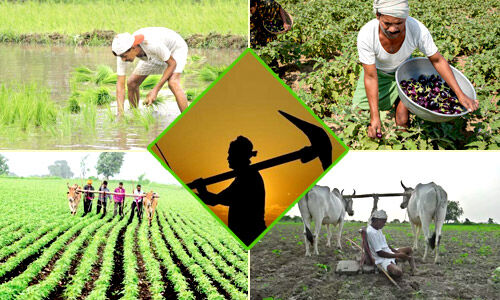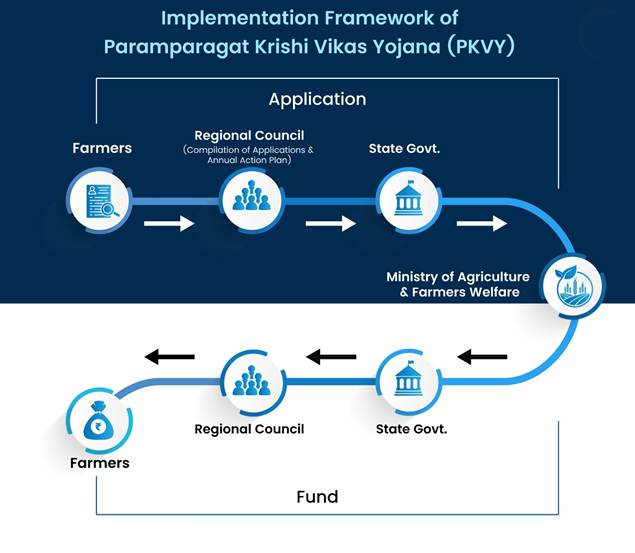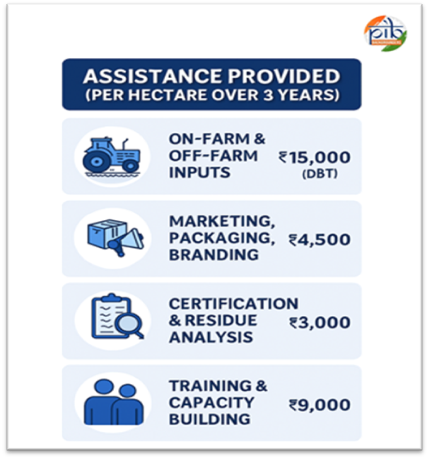Context:
Indian agriculture has historically drawn its strength from harmony with nature, relying on traditional wisdom, local biodiversity, and sustainable practices. However, with the advent of input-intensive and chemical-driven farming, the sector began facing critical ecological challenges such as soil degradation, groundwater contamination, and declining food quality. Recognising the need for balance between productivity and sustainability, the Government of India launched the Paramparagat Krishi Vikas Yojana (PKVY) in 2015 under the National Mission for Sustainable Agriculture (NMSA).
-
- Over the past decade, PKVY has evolved into a national platform for organic farming, empowering farmers to adopt eco-friendly practices, gain certification, and access markets that reward sustainability. What began as a modest cluster initiative has now become a comprehensive ecosystem linking production, certification, training, and market access, aligning with India’s broader vision of resilient and climate-smart agriculture.
- Over the past decade, PKVY has evolved into a national platform for organic farming, empowering farmers to adopt eco-friendly practices, gain certification, and access markets that reward sustainability. What began as a modest cluster initiative has now become a comprehensive ecosystem linking production, certification, training, and market access, aligning with India’s broader vision of resilient and climate-smart agriculture.
About the Scheme:
At the heart of PKVY lies the cluster-based approach, where groups of farmers — covering around 20 hectares each — collectively transition to organic farming. This ensures uniformity in production standards, promotes peer learning, and reduces costs through shared resources and collective decision-making.
The key objectives of PKVY are to:
-
- Promote eco-friendly farming practices that restore soil health and conserve natural resources.
- Reduce dependence on chemical fertilizers and pesticides by adopting natural, low-cost inputs.
- Lower production costs and enhance farmer incomes.
- Encourage the production of safe, chemical-free food for consumers.
- Strengthen farmer collectives for production, certification, and marketing.
- Promote entrepreneurship and value addition through direct market linkages.
- Contribute to the broader goals of sustainability, food safety, and rural livelihoods.
- Promote eco-friendly farming practices that restore soil health and conserve natural resources.
Financial Assistance:
Under PKVY, farmers adopting organic practices receive ₹31,500 per hectare spread over three years, covering both input and post-harvest needs. The assistance is structured as follows:
-
- ₹15,000 – On-farm and off-farm organic inputs (via Direct Benefit Transfer).
- ₹9,000 – Training and capacity building.
- ₹4,500 – Marketing, packaging, and branding.
- ₹3,000 – Certification and residue testing.
- ₹15,000 – On-farm and off-farm organic inputs (via Direct Benefit Transfer).
This end-to-end support system ensures that farmers are equipped not just to produce organically but also to certify, brand, and sell their produce in domestic and international markets, enhancing income generation and sustainability.
Implementation Framework:
The implementation of PKVY follows a farmer-centric and transparent process. Farmers with up to two hectares of cultivable land are eligible to participate. The process is overseen by Regional Councils, which play a crucial role in guiding farmers through enrolment, training, and certification.
The framework operates through the following steps:
1. Farmers apply through Regional Councils for cluster formation and certification.
2. Councils prepare an Annual Action Plan, consolidating individual applications.
3. The Ministry of Agriculture & Farmers Welfare sanctions these plans.
4. Funds flow from the Central Government to State Governments, which then transfer them to the Councils.
5. Regional Councils directly disburse assistance to farmers through Direct Benefit Transfer (DBT).
Organic Certification Systems in India:
One of the major achievements of PKVY has been its success in institutionalising organic certification, which was once a major hurdle for small farmers. India now follows two certification mechanisms under PKVY:
1. National Programme for Organic Production (NPOP):
o Implemented by the Ministry of Commerce and Industry.
o It is a third-party certification system, ensuring compliance with international standards.
o Covers the entire organic value chain — from production to export.
o Enables Indian farmers to access global organic markets.
2. Participatory Guarantee System (PGS-India):
o Operated by the Ministry of Agriculture & Farmers Welfare.
o Based on community participation, peer reviews, and local verification.
o Designed for domestic market access, especially for small and marginal farmers.
Achievements (2015–2025):
In the last decade, the Paramparagat Krishi Vikas Yojana has made substantial progress in mainstreaming organic farming:
-
- ₹2,265.86 crore released between 2015–2025.
- ₹205.46 crore allocated for 2024–25 under RKVY.
- 15 lakh hectares of farmland brought under organic cultivation.
- 52,289 clusters formed, benefitting 25.3 lakh farmers across India.
- In 2023–24, 1.26 lakh hectares continued under the scheme, while 1.98 lakh hectares were newly adopted for conversion in 2024–25.
- Large Area Certification (LAC) adopted in 50,279 hectares in Dantewada (Chhattisgarh) and 4,000 hectares in West Bengal.
- Sikkim — supported under LAC — remains the world’s only 100% organic state, covering 60,000 hectares.
- 14,491 hectares in Car Nicobar & Nancowry Islands and 2,700 hectares in Lakshadweep certified organic.
- 9,268 Farmer Producer Organisations (FPOs) registered under the Central Sector Scheme for the Formation and Promotion of 10,000 FPOs.
- Jaivik Kheti Portal developed as a national digital platform connecting 6.23 lakh farmers, 19,016 local groups, 89 input suppliers, and 8,676 buyers for the sale of organic produce.
- ₹2,265.86 crore released between 2015–2025.
Status of Organic Farming in India:
India is steadily emerging as a global leader in organic farming.
-
- According to IFOAM Statistics 2022, India ranks 4th globally in total certified organic area and 1st in the number of organic farmers.
- Major states: Madhya Pradesh, Maharashtra, Rajasthan, Gujarat, and Karnataka.
- Around 4.5 million hectares, or 2.5% of India’s farmland, is under organic certification.
- Exports of organic products stood at $708 million in 2022–23, with major commodities including flax seeds, soybeans, pulses, rice, tea, and medicinal plants.
- India is also the world’s largest producer of organic cotton.
- According to IFOAM Statistics 2022, India ranks 4th globally in total certified organic area and 1st in the number of organic farmers.
Other Initiatives Supporting Organic Farming:
-
- Mission Organic Value Chain Development for North Eastern Region (MOVCDNER): Focused exclusively on NE states, promoting value chains and marketing of organic produce.
- National Project on Organic Farming (NPOF): Promotes bio-fertilizers, training, and organic input development.
- Unified India Organic Logo (2024): Introduced by FSSAI and APEDA to replace the Jaivik Bharat and India Organic logos for standardised certification under one unified identity.
- Jaivik Kheti Portal: A one-stop digital solution for organic farmers to market their produce directly to consumers, linking buyers, sellers, and input suppliers.
- Mission Organic Value Chain Development for North Eastern Region (MOVCDNER): Focused exclusively on NE states, promoting value chains and marketing of organic produce.
Benefits of Organic Farming:
-
- Health and Nutrition: Produces food free from toxic residues, with better nutritional quality.
- Soil Regeneration: Enhances organic matter, microbial life, and nutrient cycling.
- Economic Returns: Reduces dependence on costly chemical inputs and provides premium prices.
- Climate Benefits: Organic practices sequester carbon, mitigating climate change.
- Biodiversity Conservation: Supports pollinators and beneficial species, maintaining ecological balance.
- Health and Nutrition: Produces food free from toxic residues, with better nutritional quality.
Challenges:
-
- High Certification Costs: Expensive and time-consuming, limiting access for smallholders. The EU’s non-recognition of PGS restricts export opportunities.
- Infrastructure Deficits: Limited storage, processing, and cold chain facilities increase post-harvest losses.
- Awareness Gaps: Many farmers remain unaware of certification norms, while consumers are misled by unverified “natural” or “chemical-free” labels.
- Productivity Decline: Transition from chemical to organic systems can temporarily reduce yields.
- Market Barriers: Difficulty in accessing premium markets and competing with cheaper conventional produce.
- Regulatory Hurdles: Differing organic standards across countries complicate exports.
- Climate and Pest Risks: Without chemical interventions, crops remain more vulnerable to weather variability and pest infestations.
- Insufficient Research: Lack of dedicated R&D on region-specific crop varieties and bio-inputs.
- High Certification Costs: Expensive and time-consuming, limiting access for smallholders. The EU’s non-recognition of PGS restricts export opportunities.
Conclusion:
The Paramparagat Krishi Vikas Yojana (PKVY) has redefined India’s approach to sustainable agriculture by combining traditional knowledge with modern systems. Through its cluster-based model, transparent financial support, and strong certification mechanisms, the scheme has empowered lakhs of farmers to produce safe, chemical-free food while safeguarding the environment.
| UPSC/PSC Main Question: India’s agricultural future depends not on more inputs, but on better ecosystems.” In the context of this statement, critically examine how the Paramparagat Krishi Vikas Yojana (PKVY) seeks to reconcile productivity with ecological sustainability. |









